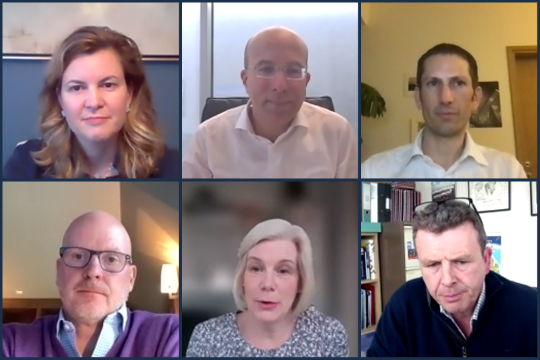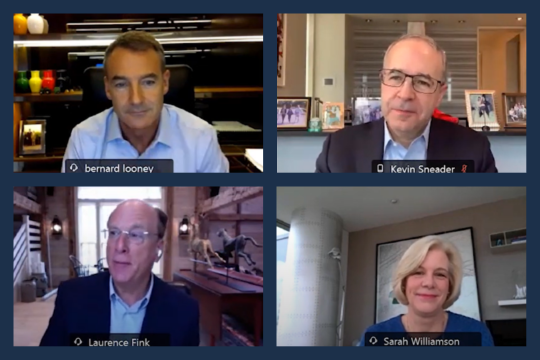
On 16 April, FCLTGlobal convened a roundtable discussion of top global investors and corporate leaders to discuss Capital Markets Solutions for a Sustainable Future.

On 16 April, FCLTGlobal convened a roundtable discussion of top global investors and corporate leaders to discuss Capital Markets Solutions for a Sustainable Future.
Commitments to net-zero objectives are taking hold across the investment value chain and present substantial opportunities. But are these initiatives likely to infuse capital into actual climate solutions, or do we risk creating structures that prioritize individual carbon neutrality while delivering less actual impact? Our conversation with investors and companies highlighted the importance of leadership in capital allocation and asset management approaches that produce measurable, long-term improvements in climate sustainability, rather than simply shifting assets to the next owner.
Discussion Leaders
| Debby Blakey Chief Executive Officer, HESTA |
Ken Mackenzie Chairman, BHP |
David Neal Chief Executive Officer, IFM Investors |
Participants
| Justin Arter Chief Executive Officer, Cbus |
Marc-André Blanchard Executive Vice President, Head of CDPQ Global, CDPQ |
Wendy Cromwell Vice Chair, Senior Managing Director; Partner; Director, Sustainable Investment, Wellington Management |
| Neil Cunningham President and CEO, PSP Investments |
Henry Fernandez Chairman and Chief Executive Officer, MSCI |
Carol Geremia President, MFS Investment Management |
| John Goldstein Head of the Sustainable Finance Group, Goldman Sachs |
Tetsuya Kodama Vice Chairman, Asia Pacific, Barclays |
David Lanning Strategy Head, Arisaig Partners |
| Howard Lee Deputy Chief Executive, HKMA |
Chow-Kiat Lim Chief Executive Officer, GIC Private Limited |
Dilhan Pillay Sandrasegara Executive Director and Chief Executive Officer, Temasek International |
| Vinay Shandal Managing Director & Partner, BCG |
Ian Silk Chief Executive, AustralianSuper |
Carsten Stendevad Senior Fellow, Bridgewater Associates, LP |
| Deanne Stewart Chief Executive Officer, Aware Super |
Mostapha Tahiri Head of Asia Pacific and Executive Vice President, State Street Corporation |
Tom Tsuneishi Chairman, Tokyo Electron |
| George Walker Chairman and Chief Executive Officer, Neuberger Berman |
Theresa Whitmarsh Executive Director, Washington State Investment Board |
Mark Wiseman Chair, AIMCo |
Several participants noted the challenge of equating climate action and divestment. While divestment can be useful as a tool, it does not necessarily provide or incentivize solutions for measurable climate change. Further, as one participant noted, asset managers and owners who divest in order to create low carbon portfolios in the short term often risk leaving “dirty” assets in the hands of actors without incentives to reduce their emissions over the long term.
According to one participant, a new “narrative of climate investment” is needed to counterbalance that of divestment. Investing in climate transitions requires taking a long-term view, as actions such as acquiring assets with higher emissions profiles in order to reduce them over time may result in portfolio emissions increasing over the short term. “We can’t reduce emissions if we can’t buy them,” noted one investor.
Furthermore, as climate risk generates increasing physical risk, there will be a need to invest in adaptations regardless of the path we on to 2050. Building climate resilience may increase emissions in the short term in order to protect certain populations while longer-term climate-friendly solutions are implemented.
There was broad agreement that changing emissions by investing in climate solutions will require greater dialogue and commitment across the investment value chain, with a focus on climate impact, rather than the achievement of individual emissions-reduction targets or “checklist washing”.
FCLTGlobal’s research and analysis demonstrate that investor engagement, including proxy voting, is important for long-term value creation. In an effort to elevate the quality of corporate governance, some investors have initiated preannouncement policies for important proxy votes across a range of corporate actions, including those related to the material impacts of their business and operations on the environment. As one participant noted, this practice encourages “owners to behave more like owners and can make the system work better” by increasing engagement and accountability.
While publicizing shareholder positions on proxy ballot questions can highlight important issues and provide points of focus for investor-corporate engagement, participants also cautioned that the effectiveness of proxy measures depends on their construction. While proxy measures can raise awareness and provide some external pressure for investors to take a more active approach, league tables that rank asset managers and owners on their voting records can be counterproductive and mask effective investor/corporate dialogue. Engagement on a particular issue may influence a company’s systemic approach to emissions reduction more effectively.
In FCLTGlobal’s recent article on emerging investor responsibilities, we noted that asset owners face changing and evolving expectations about their responsibilities with respect to different constituencies and issues. Investors in our discussion focused on how to manage climate as a key financial, environmental, and societal risk.
While investors recognize climate as a risk factor, they often also cite their obligations as fiduciaries to prioritize returns. Roundtable participants discussed the need for more data and better forms of measurement in order to better understand the climate-related investment landscape and return potential.
Balancing multiple responsibilities will be an ongoing and increasingly complex challenge for investors. However, taking a long-term approach to evaluating responsibilities – such as climate-related divestment or investment – can help investors optimize decision-making and long-term returns.
Our cross-value chain discussion highlighted the need for effective, ongoing communication among companies, asset owners, and investors as companies and investors transition their business models and portfolios to a more sustainable future. In particular, we are working on how investment boards can lead the implementation of climate-aware portfolios and how companies can incorporate climate change into their long-term roadmap for investors.
Developing tools and resources to address the issues raised in conversations like this one will be crucial as we continue our mission to rebalance capital markets to support a long-term, sustainable economy.
We welcome further suggestions and opportunities for collaboration. To learn more about the topics discussed here, view our library of resources at www.fcltglobal.org, follow us on social media @FCLTGlobal, or email [email protected].

Climate | Article
2 March 2021 - Focusing capital on long-term climate solutions via investment portfolio construction

Climate | Video
14 April 2021 - A discussion from 14 April 2021 among top business leaders and institutional investors on the opportunities ahead to position the food and agriculture industry for a more sustainable future.

Climate | Video
6 November 2020 - On Friday 6 November, FCLTGlobal and McKinsey & Company hosted the first panel in our virtual event series, "Investing in the Sustainable Transition." Larry Fink (BlackRock), Bernard Looney (bp), Kevin Sneader (McKinsey), and Sarah Williamson (FCLTGlobal) discussed the progress and outlook for sustainability within the global energy sector.